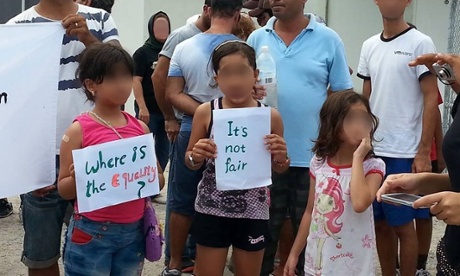Doctors working with children in offshore immigration detention centres increasingly ready to speak out, claims human rights commissioner

Australian doctors are increasingly troubled by the treatment of children in offshore processing centres and the gag clauses that prevent them talking about it, Australia’s human rights commissioner says.
Professor Gillian Triggs was responding to a new study which found most Australian paediatricians believed mandatory detention of asylum seeker children constituted child abuse.
More than 80% of almost 150 paediatricians surveyed thought mandatory detention of children was abusive, the study published in the Medical Journal of Australia on Monday found.
“I understand the health service providers, working with billion-dollar contracts, do not want their medicos speaking to the public and it’s normal practice to have some confidentiality clauses,” Triggs said.
“But in a situation like this where we have a very serious humanitarian issue, medical professionals are forced to consider whether to honour their hippocratic oath, or the terms of their contract which prevent them from being open about what they are seeing.”
Triggs emphasised that Australian health professionals were essential to the care of asylum seekers, and particularly children in offshore processing centres, and that it was important they continued to work in places such as Christmas Island and Nauru.
“But they’re seeing things they don’t think are appropriate for a mature democracy like Australia, so of course they’re conflicted,” she said.
“But they’re the only thing we have between Serco guards and the government on one hand, and a more humane policy on the other.”
She praised the study and a medical profession which has become increasingly vocal about the treatment of asylum seekers, which she said was helping to build irrefutable evidence about the harms they faced.
In August, three peak Australian medical bodies called for the establishment of an independent medical advisory body to audit the treatment of asylum seekers in detention.
“Most Australians are coming to the view that the detention of children for unprecedented periods of time is not justified in terms of stopping the boats,” Triggs said.
On Friday she handed down the Human Rights Commission’s draft report on children in detention, which documented high levels of mental illness and self-harm. She is limited in what she can say about that report until it has been tabled in parliament.
“But studies like this are very valuable to us and our work,” she said.
Professor David Isaacs, a Sydney paediatrician who has run a refugee clinic at the children’s hospital at Westmead for the past decade, co-authored the study and said it was the first to investigate Australian paediatrician attitudes towards asylum seekers.
The refugee children he treated were often suffering from post-traumatic stress disorder, night terrors and bed-wetting, he said.
“I think a key way we can stop people from being so anti-asylum seeker is to point out that children are the total innocents in this,” Isaacs said.
“They’re fleeing horrible situations, often where their parents have been harmed and shot at, and so these children are really traumatised and then we compound it by putting it them in prison.
“They are fleeing oppression and begging for mercy and our response is to lock them up.”
His study found specialists had poor knowledge of health screening and Medicare eligibility of children detained offshore, he said.
Dr Peter Young, who for three years was the chief psychiatrist responsible for the care of asylum seekers in detention, said confining hundreds of people in an institution like a detention centre created an environment for sexual abuse and illness to occur.
“It creates situations where sexual abuse is inevitable and it’s happened everywhere around the world,” he said. “You can’t create a detention policy like we have without knowing this – it’s wilfully ignorant.”
Last week, the federal government announced it would investigate reports of abuse and sexual misconduct by staff against children on Nauru.
Young agreed with Triggs that health workers were increasingly ready to speak out.
“Doctors take an oath to do no harm,” Young said.
“And while they are doing good work on offshore processing centres to minimise that harm, at some point you have to ask yourself: where does it end?”
